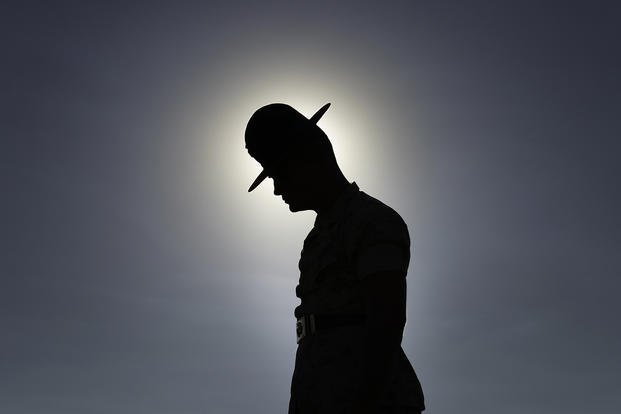One recruit was called a terrorist. Another had his vest stapled to his skin. A third recruit was kicked by a Marine and a drill instructor ordered a fourth trainee to eat a pine cone.
Those are just some of the incidents that led to more than 20 Marines being disciplined at the Corps' West Coast recruit depot since 2017, officials there confirmed. At least two of those Marines are no longer in uniform as the service works to stamp out hazing and abuse at its entry-level training camps. The issue has been a renewed focus since the 2016 death of recruit Raheel Siddiqui at Marine Corps Recruit Depot Parris Island, South Carolina.
The Washington Post first reported on the discipline handed down to the Marine Corps Recruit Depot San Diego drill instructors. The paper obtained more than 700 pages' worth of investigations into alleged wrongdoing at the recruit depot.
"The incidents in San Diego, which have not been reported previously, include verified allegations of Marines assaulting recruits by kicking, punching and shoving, activity that is explicitly prohibited under the service's regulations, and other more minor incidents," the Post reported.
After one drill instructor asked a recruit who appeared to be of Middle Eastern descent whether he was a terrorist, another Marine at the San Diego recruit depot reportedly referred to a Hispanic trainee as a "wetback," a disparaging and racist term.
That same recruit was then kicked by the Marine, who the Post reported was an instructor with Weapons and Field Training Battalion.
Another recruit, according to the Washington Post, reported that a drill instructor used a stapler on his torso. The recruit didn't speak up at the time, the Post reported, because he "did not want to anger [the drill instructor] more."
When the senior drill instructor who'd been told about the incident asked other recruits about potential wrongdoing, the Post reported the same Marine who'd been accused of using a staple had ordered him to eat a pine cone during a hike.
"The recruit said he did not report that incident right away because he thought that sort of thing happened at boot camp," the Post reported.
Related: Report: Marine Corps Punished at Least 8 Instructors over Hazing Claims
Marine officials stressed that the incidents represent only a "very small percentage" of drill instructors who "fall short and must be held accountable."
The most serious cases the Washington Post reported on happened more than two years ago, Capt. Martin Harris, a spokesman for the recruit depot. They were thoroughly investigated, he said, and the command took immediate action.
The drill instructor involved in the stapler and pine cone incidents was formally reprimanded and received administrative punishment that resulted in a reduction of rank, removal from his job as a drill instructor, and a forfeiture of two months' pay, Harris said. That Marine left active duty in January 2018.
The Weapons and Field Training Battalion Marine also faced a formal reprimand and administrative punishment, Harris added. That included a loss of rank, 60-days liberty restriction and forfeiture of pay. The Marine left active duty in September 2018.
"There has been significant progress in the area of professional conduct since that time," Harris added. That includes more training and education to prevent misconduct among drill instructors, which he said has led to a decline in misconduct over the last 24 months.
"More engaged officer and senior staff noncommissioned officer leadership at every level has helped to identify small infractions when they occur, allowing leadership to correct deficiencies earlier and prevent unprofessional behavior from taking root," Harris said.
Still, the cases -- along with those of eight Marines at Parris Island -- highlight the challenges the Corps has faced in combating mistreatment at its recruit depots. The investigation and trials following Siddiqui's death found a culture of hazing and abuse at Parris Island -- not only toward recruits, but among drill instructors, too.
Siddiqui's drill instructor slapped him in the face after forcing the recruit to run back and forth across the squad bay, despite his having requested medical attention for a sore throat. After he collapsed and was slapped, Siddiqui suddenly ran toward a barracks stairwell and fell 40 feet to his death. He'd only been at boot camp for a little over a week, and his drill instructor had previously been accused of forcing recruits into industrial clothes dryers.
Recruits are told about the Marine Corps' zero-tolerance hazing policy before they even get to boot camp, Harris said. They're encouraged to report any violations without fear of retribution, he said.
"Additionally, recruits are repeatedly interviewed by officer leaders throughout training and asked specifically about any maltreatment they may be aware of," he said. "Moreover, chaplains, medical staff, mental health counselors, and other support staff are available to recruits throughout their life-changing experience at recruit training."
Almost all drill instructors serve with distinction, Harris said, but any who choose to violate regulations and orders will be quickly corrected.
"There is no place for hazing or abuse within our ranks," he said.
-- Gina Harkins can be reached at gina.harkins@military.com. Follow her on Twitter @ginaaharkins.
Read more: Former Recruit Commander Pleads Guilty in Parris Island Hazing Scandal













